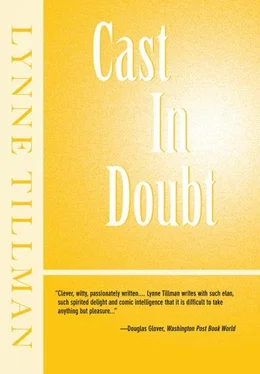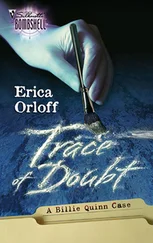Pointing to the stars ironically, Gwen contended — no, contested — with the sky and with me yet again. The so-called natural world existed only as a reproof, only to taunt us human beings, to tease us, for weren’t we the ones to conceive of Nature to begin with? Hadn’t we invented it? Innate is inane, don’t you think so, Lulu?
Then, under the imperturbable sky, Gwen metamorphosed. She became stunningly solemn. She whispered into my ear, as if there were someone else sitting at our table, someone who ought not hear her confidences, that it was not so long ago when she had realized that she had been waiting, but she had not known that, waiting for someone or something, and now that seemed ridiculous. Life did not have meaning or purpose, she knew, but perhaps it required an investment, an act of faith. But she had so little — and here she grimaced — of that tender capital. Gwen claimed it was too late for that, for her. I denied it. I told her she had all the time in the world.
All the time in the world, I pontificated. What things I pronounced and with what surety! As much as I didn’t hear Gwen, I didn’t hear myself. But I am racing ahead now. When logic is no longer a comfort, it’s hard to keep orderly the sequence of events. But I suppose she did know then what she faced, what had to be done or confronted, and had come to visit me in order to tell me, but she didn’t, not then, and instead, perhaps, Gwen involved herself with John and Alicia, in some grotesquerie calibrated to stymie the ugly and the ineluctable. She referred to it, their affair, as a grotesquerie, and I suppose it was — one meant, I assumed, to frighten away malign spirits. Which ones precisely, I hadn’t a clue. Whatever clues Gwen dropped for me were laid much too subtly and well, or, as she might put it, were dropped down too deep a well!
I dreamed last night I knew precisely how to finish Household Gods. I was at the fourth and last part, which meant that the book was in that many parts. Its design, the whole, had been revealed to me. But I could not actually see what had been revealed, for the writing was faded or always, somehow, illegible. I was continually frustrated. Because travel was involved — I was moving from place to place — the dream seemed to imply that I had to find something or someone, Helen, I presume, before I could finish my book. It was most assuredly the strangest dream I’ve ever had. There was something about death in it, my mother’s death, I think, but it may have been my own. While I accept the Greek version of destiny, or fate, as in tragedy, when one’s end flows from one’s flaws, from hubris, I abhor the idea that one’s life is fated. Fate in its Californian manifestation — horoscopes and astrology — is anathema to me. So it struck me as bizarre that my dreamworld was invaded by something like a fate. But then I was engrossed in the Gypsy book. And doesn’t Freud say, if I remember correctly, that dreams are concoctions, condensations, of what happened during the day.
With Gwen, the evening and its events dangled delicately from a string, twisting this way and that. There was no plan, no plot, and one seemed not to have any intentions at all. Time always behaves like that with Gwen; it is stretched and fuller than with others, with whom time is less substantial, less rich. Time is more intense in Crete. It is unfortunate that we were interrupted — first, and rather rudely, by Roger. Then by others.
Life is interruption, a series of interruptions. In fact, The Interrupted Life could be my memoir’s title. I jot that down in my notebook and reach for the Gypsy book once more. But I am disquieted. I have to act, to take action. I know what I have to do. In a sense and inwardly, I have made my decision. I have just not yet moved. But I know I must and that I must persevere; I must not perseverate. Agitated, I call out to Yannis, Please come here and bring the heavy bond paper and envelopes and the party list; I’m disinviting everyone. The party was supposed to have been held in two days. I had vacillated long enough, primarily about whether to cancel it and risk offending Gwen, in whose honor it was being thrown, or to go ahead with it and delay my search for Helen. Somehow, all along, I knew I would put it off. It is a funny thing, human nature. One knows and yet pretends one doesn’t. But why?
Resolved to act, I also hoped to make Gwen understand my decision. Also, I thought petulantly, as I was handed the writing paraphernalia by a sulky Yannis, I had had enough conversation last night to last me a lifetime.
I write what I hope are gracious disinvitations, each calibrated to charm its intended, the recipient, but I can’t help recalling, even recapturing, those incendiary conversations, and how, first, Roger slid up to Gwen and me, barging into our fragile dialogue without so much as a by-your-leave.
My word! I exclaimed, my word! Roger, you’ve taken me by surprise again, sidling up to us like one of those poisonous snakes in Texas. Three converge there, I believe. Roger sat down, though he hadn’t been invited, and I reminded myself that we were three, too, and I hoped Roger wouldn’t take that up. Thankfully he replied, Six or seven of the deadliest snakes in the world are found in Australia. Do you like snakes, Gwen? He faced Gwen and studied her expectantly, as if he were about to test her in some way. But Gwen — too smart to fall for Roger’s impetuous nonsense — swallowed her wine and wiped her thin lips with the back of her hand. It seemed a rude gesture, almost a Neapolitan insult. It was in any case oddly severe, which Gwen can be, oddly severe. Finally, she answered with two words: Some snakes.
I don’t know why, foolishness or inebriation, but I started to tell Gwen, in front of Roger, some curious material about the Gypsies. I had dipped further into the book, and what had immediately caught my attention was etymological — the word “Gypsy” first appeared in English in 1537; also, there was no word for Gypsy in their own language, Romany. But more, I went on, and this related to my absorption in the subject of death, I explained that Gypsies believe they were Christ’s bodyguards. The myth was that two Gypsy bodyguards had become drunk, had left him unprotected, and this is how he came to be crucified. Roger looked smug. I disliked him intensely in that moment.
Gwen knew someone of Gypsy origin, of course. She had spent time with Django Reinhardt’s nephew, who was, like Django, a musician. He was blond and fair, and given to wearing black leather from head to foot. It was a story about feet or boots — his boots — which Gwen narrated for me, though Roger sat near us listening; for in a sense she spoke only to me and subtly ignored him. He did not care; he stayed, as if an observer at our table. I will never forget the story.
Gwen had traveled to London some years back — I hadn’t known she’d been there then — and resided in a squat, a house taken over by hippies, I gather, to which the Reinhardt boy had come. There was no romance, but she loved to listen to him play the violin. She said he had talent, which for Gwen was a rare compliment. But then she was partial to musicians, and may have been in London precisely because her musician was there, but I didn’t ask. One of the house dwellers took an intense dislike to the Gypsy violinist. And for some reason or other, one afternoon Reinhardt disappeared. Later, as the house dwellers or squatters were having tea in the kitchen, they heard the strains of a melancholy tune. It was Reinhardt, playing the violin. He had gone to the roof of the house, as if to play for the world, Gwen thought then. The roof was in disrepair. Gwen recalled vividly the moment the violin music stopped. She heard a series of squawks. Then one black leather boot descended through the ceiling of the kitchen, which was at the top of the house. The English fellow, a poet, the one who disliked the Gypsy violinist, yelled, “That’s the Gypsy. He ruins everything he touches.”
Читать дальше












